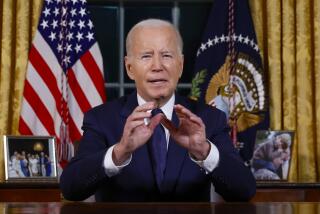COLUMN RIGHT / TOM BETHELL : Two Bushes: One Foreign, One Domestic : Upbringing accounts for the man’s strengths, weaknesses; he’s stronger now, but could lose.
- Share via
There was an illuminating moment in George Bush’s acceptance speech, when he sounded a note of real conviction. It came in what he called an “aside,” but it shed unexpected light on his strengths and his weaknesses as President. “This is a political year,” he said, at the end of a discourse on foreign policy, “but there’s a lot of danger in the world. You can be sure I will never let politics interfere with a foreign-policy decision. Forget the election: I will do what’s right for our national security.”
This was a promise that came from his heart, and you sensed he wouldn’t even be tempted to break it. You felt also that it was the key to understanding what has been so baffling: that we should find in one man a facility and an ease with foreign policy, and the greatest of difficulty with domestic policy.
Bush grew up steeped in the gentlemanly tradition in which politics was seen as something inherently distasteful. Nonetheless, scions of wealthy families were regularly expected to enter “public service,” mainly in order to “give something back” to the system that had given so much to a fortunate few. The understanding in such cases was that the gentlemanly officeholder would do the right thing, not merely the expedient thing. Cushioned by family money, he could cheerfully accept the possible consequence of such conspicuous virtue--electoral defeat.
This philosophy can often work out quite successfully with foreign affairs, because there is a tradition that “politics stops at the water’s edge.” In order to pursue foreign initiatives, Bush has not been obliged to do much in the way of politicking. He just went ahead and did what he felt was right, whether it was Mideast peace negotiations, or launching an assault on Manuel Noriega in Panama.
In the case of Desert Storm, he did have to persuade Congress, and he was successful in doing so, almost certainly because he started out with the assumption (not really justified but nonetheless confidently held by him) that the war-making decision was his to make: Congress had no right to obstruct him. And so he prevailed. Had he wavered in the slightest, Congress would surely have blocked the attack on Baghdad.
In domestic affairs, of course, politics is inherent in any action at all. Bush knows it, and this has undermined his confidence. He knows, for example, that there are certain domestic imperatives for a Republican President: The growth of government must be restrained, perhaps cut back; taxes should not be raised, especially after a conspicuous promise not do so. But these goals could not be achieved simply by phoning the Pentagon or the State Department. Achieving them would require political hardball--something the gentleman pol would really rather avoid.
Bush, then, pursued the distasteful business of domestic politics all too generously, conceding at the outset that his adversaries in the congressional leadership share his ultimate goals, which they do not (what they really want is to seize the White House back from the GOP). So Bush tried to work out deals and compromises with them, in the course of which he and the GOP got taken every time.
Where does this leave George Bush now? It has been my conviction since the late 1970s, when inflation moved the middle class into higher tax brackets without benefit of legislation, that presidential elections have been ultimately decided by the single issue of taxation. At the end of the GOP convention four years ago, when Bush promised “no new taxes,” I was confident that he would win. As Bush said on Thursday night, his decision to break this promise was, putting it mildly, a “mistake,” a “bad call.” It was a disaster, and only the most generously disposed will accept that, in dealing with the House and Senate leadership in 1990, Bush’s back was “against the wall.” He had not felt that way in dealing with Saddam Hussein.
In his acceptance speech, Bush again sounded an uncertain trumpet on the tax issue. He “will propose to further reduce taxes across the board--provided we pay for these cuts with specific spending reductions.” In other words, he will cut taxes--if Congress gives him permission to do so. How will this play in November?
Assuming that the tax issue is really crucial, the undecided taxpayer has to choose between: a Republican President who irresolutely raised taxes when he didn’t have to, but now says he made a mistake and will try to cut taxes; and a Democratic candidate who is actually promising to raise our taxes. Looked at this way, then, Bush may be the better bet to the undecided voter. I am not confident of the outcome this year, however. The result will be close, but Bush looks much stronger than he did a week ago.
More to Read
Get the L.A. Times Politics newsletter
Deeply reported insights into legislation, politics and policy from Sacramento, Washington and beyond. In your inbox twice per week.
You may occasionally receive promotional content from the Los Angeles Times.










